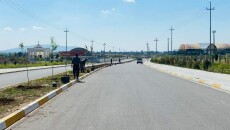For the first time in Daquq district of the northern, oil-rich province of Kirkuk, the local administration will require pharmacies to be on shift at night.
The decision of the Judicial Administration was issued a few days ago by the Pharmacists Syndicate in Kirkuk at the request of Dquq residents.
“Previously, in emergencies, we had to go to Kirkuk at night due to the lack of night shift pharmacies in Daquq,” Hassan Abdel Razzaq, a resident of Daquq, told (KirkukNow), praising the decision to require pharmacies to be on guard on duty.
There are 14 pharmacies in Daquq, all of which close in the evening, and as of now, each one of them will have to work on guard duty two days a month and will be open from the evening until 6 a.m. the next day.
Samir Khalil, the owner of a pharmacy in Daquq, told KirkukNow, “We have no problem with the night shift, but we need the presence of security forces to protect us.”
Daquq is 44 kilometers south of the city of Kirkuk and its population is estimated at more than 97,000 people.
Iraq’s healthcare system which was once one of the most advanced in the region now is in serious crisis. There’s a shortage of buildings, drugs, and the medical staff to administer it. Over the past three decades, the country has been ravaged by the Iraqi-Iran war, Saddam Hussein’s invasion of Kuwait, the ousting of Saddam's regime followed by sectarian violence, the war against al-Qaeda, and the rise of Islamic State in Iraq and Syria ISIS.
The political chaos after 2003, pushed an estimated 15,000 out of 52,000 registered Iraqi doctors to leave the country. The young student doctors primarily seek training and life abroad rather than permanent state employment.
Omid Mohsen, head of the Pharmacists Syndicate in Kirkuk, told KirkukNow, “We received many requests from Daquq regarding night pharmacies... We informed all the pharmacies and each one of them will work with the night shift system according to a specific schedule.”
In 2019, the Iraqi government allocated just 2.5% of the state’s $106.5 billion budget to its health ministry, while security forces received 18% and the oil ministry 13.5%. The same was true for 2014.
Over the past decade, data from the World Health Organization WHO shows that Iraq’s central government has consistently spent far less per capita on healthcare than its much poorer neighbors - $161 per citizen each year on average, compared to Jordan’s $304 and Lebanon’s $649, a report by Reuters found.
The northern, oil rich-city of Kirkuk, is home to about 1.7 million Kurds, Turkmens and Arabs, according to the KRG figures in 2018. Located 238 kilometers north of Baghdad, Kirkuk is an ethnically mixed province and has long been at the center of disputes between Baghdad and the the KRG.






